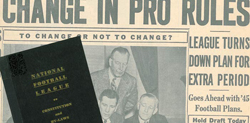The NFL goes into overtime
The National Football League made its first ruling on sudden death overtime in the late 1930s. One year after the Chicago Bears and Portsmouth Spartans played a one-game playoff to determine the 1932 champion (the team with the best regular season record was named champion at that time) the NFL divided into two divisions. A new format in 1933 called for a championship game to be played between the division champions. From the outset there was discussion about sudden death.
 However, it wasn’t for several more seasons that the NFL faced the need to make a decision on overtime. Late in the 1930s, it appeared that the New York Giants and Washington Redskins might end up deadlocked in the Eastern Division. As a result, the NFL addressed the idea of sudden death overtime. According to newspaper accounts, sudden death rules were put in place in the event a one-game playoff was needed to determine a division winner. It ended up a non-issue as the Giants distanced themselves from the Redskins and claimed the division crown outright.
However, it wasn’t for several more seasons that the NFL faced the need to make a decision on overtime. Late in the 1930s, it appeared that the New York Giants and Washington Redskins might end up deadlocked in the Eastern Division. As a result, the NFL addressed the idea of sudden death overtime. According to newspaper accounts, sudden death rules were put in place in the event a one-game playoff was needed to determine a division winner. It ended up a non-issue as the Giants distanced themselves from the Redskins and claimed the division crown outright.
Official inclusion of the ruling was not placed into the NFL bylaws until 1941 with the addition of Section 6 labeled “Sudden Death System” under Article XX titled “Divisional Play-Off-Game.”
The overtime rule only applied to the divisional game and not the championship game. However, sudden death received more attention in newspapers when the Chicago Bears and Green Bay Packers finished the ’41 season with identical 10-1-0 records in the Western Division to force the first divisional playoff game in NFL history. The hype of sudden death was short lived that day as the Bears defeated the Packers convincingly 33-14. But, that playoff game spurred more debate regarding sudden death.
NFL bylaws at the time called for the awarding of co-champions should the championship game end in a tie. It wasn’t until 1946 that the league ruled for sudden death overtime for the title game. It was officially declared in writing starting with a one-sentence Section 9 under Article XIX (Championship Game):
If the game results in a tie score, the sudden death system of determining the winner shall prevail, as more particularly set forth in Article XX, Section 6 hereof.
The following year, a one-page description of the sudden death method was added to the NFL’s Official Rules (see page).
The league’s first experiment with overtime came during a 1955 preseason game. The Los Angeles Rams defeated the New York Giants, 23-17, in a game played in Portland, Oregon. Three years later, the Giants and Baltimore Colts made overtime famous during the 1958 NFL Championship Game. The Colts, on a one-yard TD run by fullback Alan Ameche, defeated New York to win the NFL title. The thrilling sudden death finish resulted in that contest forever being known as “The Greatest Game Ever Played.”
Sudden death overtime was instituted for regular season and preseason games beginning in 1974.